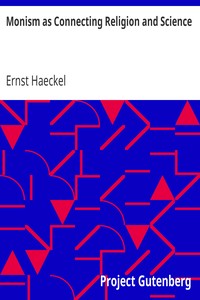Monism as Connecting Religion and Science by Ernst Haeckel
"Monism as Connecting Religion and Science" by Ernst Haeckel is a scientific publication written in the late 19th century. The book contains a lecture delivered by Haeckel in 1892 aimed at reconciling the often antagonistic views of religion and science through the lens of monism, a philosophical standpoint asserting the unity of all things. Haeckel emphasizes the scientific understanding of nature as a cohesive entity and explores how this understanding can bridge
the gap between empirical knowledge and spiritual belief. In this work, Haeckel outlines his views on monism, defending it against dualistic and pluralistic frameworks prevalent in traditional religious philosophies. He argues that all natural phenomena, including life, consciousness, and morality, can be understood through a unifying scientific perspective that sees humanity as part of a single cosmic process. The book delves into biological evolution, physical laws like the conservation of energy and matter, and even proposes a pantheistic view of divinity that aligns with scientific understanding. Haeckel ultimately asserts that a monistic approach not only respects the complexity of nature but also provides a robust ethical framework that can foster a deeper appreciation of both science and religion. (This is an automatically generated summary.)
Read or download for free
| How to read | Url | Size | |||
|---|---|---|---|---|---|
| Read now! | https://www.gutenberg.org/ebooks/9199.html.images | 141 kB | |||
| EPUB3 (E-readers incl. Send-to-Kindle) | https://www.gutenberg.org/ebooks/9199.epub3.images | 129 kB | |||
| EPUB (older E-readers) | https://www.gutenberg.org/ebooks/9199.epub.images | 131 kB | |||
| EPUB (no images, older E-readers) | https://www.gutenberg.org/ebooks/9199.epub.noimages | 118 kB | |||
| Kindle | https://www.gutenberg.org/ebooks/9199.kf8.images | 315 kB | |||
| older Kindles | https://www.gutenberg.org/ebooks/9199.kindle.images | 306 kB | |||
| Plain Text UTF-8 | https://www.gutenberg.org/ebooks/9199.txt.utf-8 | 121 kB | |||
| Download HTML (zip) | https://www.gutenberg.org/cache/epub/9199/pg9199-h.zip | 127 kB | |||
| There may be more files related to this item. | |||||
Similar Books
About this eBook
| Author | Haeckel, Ernst, 1834-1919 |
|---|---|
| Title |
Monism as Connecting Religion and Science A Man of Science |
| Credits |
Text file produced by Lee Dawei, Thomas Berger and Distributed Proofreaders HTML file produced by David Widger |
| Reading Level | Reading ease score: 41.3 (College-level). Difficult to read. |
| Language | English |
| LoC Class | B: Philosophy, Psychology, Religion |
| Subject | Religion and science |
| Subject | Monism |
| Category | Text |
| EBook-No. | 9199 |
| Release Date | Oct 1, 2005 |
| Most Recently Updated | May 10, 2013 |
| Copyright Status | Public domain in the USA. |
| Downloads | 722 downloads in the last 30 days. |
| Project Gutenberg eBooks are always free! | |

